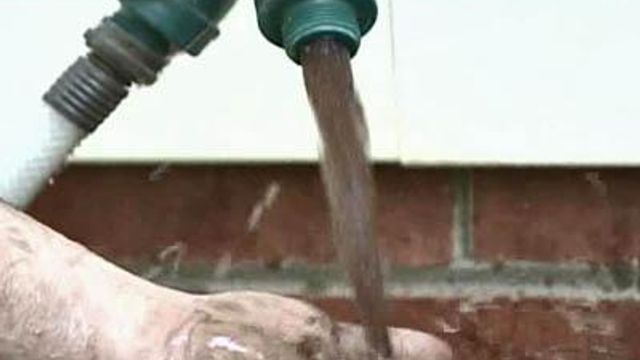Problems Flow in Private Water Systems
Community wells serve more than 720,000 people across North Carolina, but state records show those privately run systems are far more prone to problems from mismanagement to water monitoring to contamination.
Posted — UpdatedHorseshoe Mobile Home Estates in southern Wake County is among the more frequent offenders in the Triangle for improper monitoring of water quality, according to state records. The park is under new management.
"They say it's good to drink, but when you live here and after drinking some of it, it just leaves a taste in your mouth," resident John Stevers said. "The taste is bad, and I just don't trust it."
Stevers said he now drinks bottled water.
Unlike municipal water plants, smaller private systems like the one serving the mobile home park often have part-time people in charge of treatment and testing.
"We do tend to get more complaints and issues that come up at the smaller private systems," said John McFadyen, chief of the Public Water Supply Section of the state Division of Environmental Health. "They just don't have that much attention."
The state oversees systems that serve at least 15 customers year-round, and officials rely on operators to conduct tests and submit the results each quarter. Regulators get involved only if system operators notify the state of problems or if reports aren't submitted.
Unregulated "transient systems" traditionally have more violations, officials said, but they acknowledged that staff limitations means some wells aren't monitored as much as they should be.
Dan Carcopo, who lives in Johnston County's Southgate subdivision, is so wary of his water that he replaces the filter under his house once a month.
"I said, 'Hey guys, my water tastes like a swimming pool. What do you want me to do with it?' (They responded) 'Oh, you just have to filter it,'" Carcopo said.
At an outdoor faucet between filters, the water looks like chocolate milk.
Aqua North Carolina, which supplies the well water, maintains only harmless sediment needs to be flushed. But Southgate residents regularly get notices that the radium levels exceed drinking water standards.
Radium is a naturally occurring radioactive element that, in high doses over a long period of time, is linked to cancer.
Carcopo said he is worried for his a young son.
"He's been drinking the water for X amount of years, been mixing it with formula and stuff like that," he said.
The Division of Environmental Health has no recent documented cases of people getting sick from their water.
Aqua North Carolina President Tom Roberts said drinking water regulations changed in recent years to cover radium. The company recently built a well house and continues working on ways to remove the low-level radioactive waste, he said.
"Not only do we have to do something, but we have to do it in an economic way, and that's why we're taking our time," Roberts said, calling the radium "a very minimal health risk."
According to 2006 and 2007 North Carolina Utilities Commission records, customers complained more about Aqua than any other private water supplier.
Roberts attributed that to his company's size. In 2004, Aqua took over Heater Utilities and other struggling private systems.
"The bigger you get, the more complaints you're going to get," he said.
Because of past problems, state inspectors encourage more regionally managed community systems, a strategy that lends itself to larger companies like Aqua.
State inspectors said Aqua has a good track record of reacting to water problems, many of which it inherited.
But many private water customers remain thirsty for more regulation.
"I think the state needs to start cracking down on them," Carcopo said. "Give me clean water. You know, something safe to drink."
"Attention's on the big cities. It's not on the little communities," Stevers said.
• Credits
Copyright 2024 by Capitol Broadcasting Company. All rights reserved. This material may not be published, broadcast, rewritten or redistributed.




